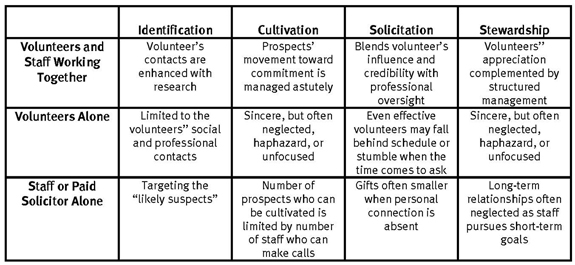The Role of Volunteers in Development
Contrary to some notions today, volunteerism is more important than ever. In a time when more and more fundraising efforts are partially or completely dependent on professional staff, the notion of volunteerism in development may seem impractical or even anachronistic. Admittedly, managing a corps of volunteers can be just as much work, and perhaps even more so than assigning the same tasks to employees. So why bother? We can offer several reasons.
1. The impact on the volunteers themselves. Long-term financial commitment is built upon a tradition of voluntary involvement. When volunteers internalize an organization’s mission and case for support, and begin to articulate it in their own words and experiences, they have invested themselves in the future of the organization — they have invested themselves as owners.
2. Donor prospects give more generously to volunteers. It is widely accepted that in most cases a prospective donor is more likely to respond generously to a committed and capable volunteer than to a paid staff member, no matter how impassioned or articulate the request.
3. Volunteers’ motives are clear. Staff members or paid solicitors may be perceived as merely doing their jobs. While a formal letter or courteous phone call from the development officer could go unanswered for months, an inquiry from a friend or business peer will almost always get a response.
When a volunteer issues an invitation or advocates for a cause, his or her charitable motives are clear.
4. Volunteers provide accountability and credibility. They are your eyes and ears in the community and the community’s eyes and ears within the organization. Wise volunteers help to ensure that an organization’s mission is meeting real community needs, while at the same time helping to ensure that the organization receives the recognition and support to sustain that mission.
5. Volunteers work best with your staff. Let’s not discount the role development staff plays in this equation, through the cycle of fundraising: identification, cultivation, solicitation and stewardship. The most effective team approach combines the advantages of voluntary leadership with the oversight of professional management.
click here for a pdf version: FRM61

